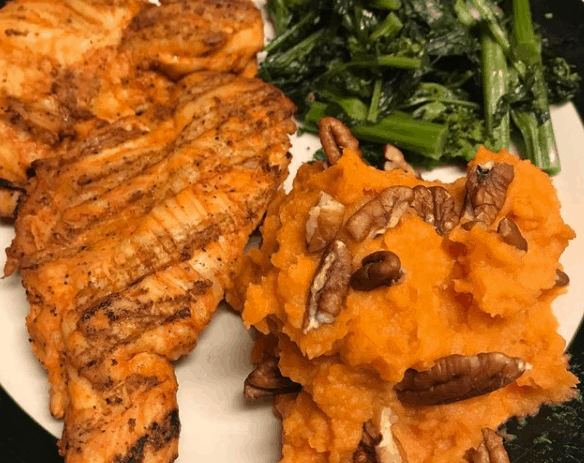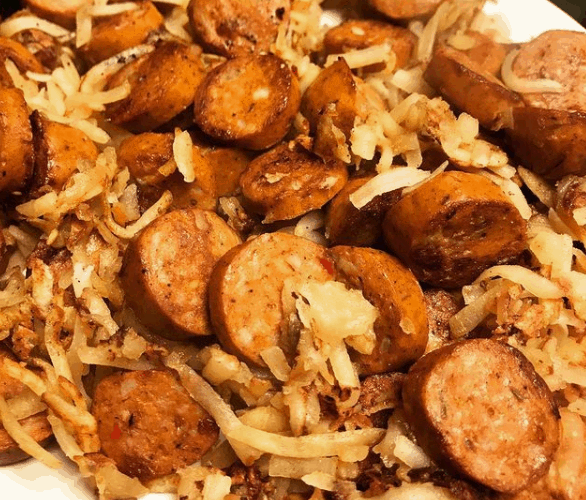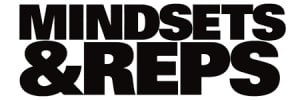
Many lifters use the term bulking as an excuse to eat whatever they want. Typically this occurs during the holidays when junk food is at a premium, so the timing is very convenient. And this is fine; it’s hard to eat right all the time and tracking food intake every day gets monotonous. But let’s be honest and call it what it really is, a dirty bulk.
Dirty bulks typically do more harm than good. They lead to an unfavorable and disproportionate amount of fat gain relative to muscle gain. You gain weight, but in the wrong places. Then when it comes time to cut down you have quite a bit of work to do. That unwanted fat is hard to get rid of.
A lean bulk is a more appropriate way to put on muscle mass. Naturally there is some fat gain, but if done properly it will be limited. A lean bulk is strategic, well thought out, and involves measuring and tracking food intake for most people.
The best macros for lean bulking are a 40/40/20 ratio of carbohydrates, protein, and fat at a 300-500 calorie surplus above maintenance levels.
Why 40/40/20
There’s rarely any confusion when it comes to protein intake for building muscle. Most educated fitness enthusiasts know that 1 gram per pound of bodyweight is the gold standard. There’s even evidence from researchers like Jose Antonio which show that more than that is also favorable for body composition.
The true question is the ratio between carbohydrates and fats. In this instance, carbohydrates make up 40% of the dietary calories for a variety of reasons. Carbs are the best energy source for resistance training, and despite this being an article on diet I have said on record many times how critical hard training is for muscle building.
It’s important to fuel properly to get the most out of each workout. Carbs provide that fuel and also aid in recovery, which is another important component of lean bulking. It’s not just about one workout, it’s about consistency. Building maximum amounts of muscle doesn’t happen overnight.
Carbs also help to stimulate appetite. Bulking means that you will be consuming a higher volume of food than normal. And since it’s not a dirty bulk, the diet will be primarily made up of minimally processed whole foods. It’s easy to down a whole plate of cookies, but a 7 ounce chicken breast for meal 5 isn’t always easy. Carbs speed up digestion and have the greatest impact on blood sugar levels, which can increase hunger.
Fats make up the final 20% of the equation. Fats are not a dominant fuel source for most intense physical activity; they serve as more of a backup or reserve fuel source. However they are not to be neglected completely. Healthy fats are important for keeping testosterone at optimal levels and help to balance other hormones as well. This is not a linear relationship though, more fats do not increase your testosterone beyond a normal range, they simply keep them at a healthy level.
In order to build as much muscle as possible, you need to be in a caloric surplus. But if it’s too large it can lead to unnecessary fat gain. This is why we aim for a 300-500 daily caloric surplus rather than something crazy like 1,000 or more.
What Foods to Choose
Digestibility is a major factor when choosing what to eat on a lean bulk, particularly for a pre workout meal. A common mistake people make is having a large, heavy meal right before they train. They inevitably feel lethargic and slug through a subpar workout. The whole point of a bulk is to have amazing workouts every time.
Foods that digest well for one individual may sit like a stone in another. There is a great deal of individual variance in that regard. But at risk of not giving tangible advice, I can say that fast digesting carbs like rice cakes, fruit, cereal, and granola work well for a lot of people.
High Quality Proteins
Protein is an irreplaceable component of any muscle building diet, as protein is the only macronutrient which directly builds muscle. It’s important to choose complete, high quality protein sources. Complete means that the protein source contains all 9 of the essential amino acids needed to build muscle. Essential amino acids cannot be synthesized by the body, so they must be obtained via diet.
High quality protein sources include chicken, turkey, fish, red meat, dairy, eggs, and protein supplements like whey. Diversity in protein sources is important as well. Complete proteins have all the essential amino acids, but in different amounts. Eating a variety of different sources ensures sufficient amounts of all aminos.

Nutrient Dense Foods
Some people in the flexible dieting community lose sight of the importance of vitamins, minerals, and phytonutrients that different foods provide. They focus on macronutrients, but forget about micronutrients. While it’s important to hit your macronutrient targets daily, the bulk of the diet should be made up of nutrient dense foods.
There is saying that goes “eat the rainbow”, which means that you should eat foods that are a variety of colors. This is because the color of a food is often reflective of the nutrients it provides. For example, orange foods like carrots, sweet potatoes, and pumpkin contain beta carotene, a source of vitamin A.
Bulking doesn’t have to be just chicken, rice, and broccoli all day. Fatty fish like salmon and grass fed beef are good sources of omega-3’s, which have a variety of health benefits. Instead of eating peanuts, opt for more nutrient dense and calorie dense varieties like walnuts, macadamia nuts, and Brazil nuts.
Take advantage of the calorie surplus and get the most out of each food you put in your body. This isn’t always possible when dieting since the calorie and macronutrient constraints are greater. You don’t have the luxury of choosing nutrient dense foods because they may also be high in calories.
Supplementation and Other Tools
While supplements are secondary in importance to diet, they can still play a role in the muscle building process. Some people are skeptical about the effectiveness of supplements, which is somewhat warranted since many have limited research. But the options below have undeniable research showing their efficacy.
Creatine
There isn’t a better supplement for the purposes of building muscle than creatine. Creatine pulls water into the muscle cell, making it larger and hydrated. People mistake this for subcutaneous water retention, meaning directly under the skin. Creatine will not make you puffy and bloated. It will however make you bigger and stronger.
Most people are aware of the increases in lean body mass and anaerobic power when supplementing with creatine. That’s enough to get anyone to purchase it. But there are other, lesser known benefits as well.
Creatine has shown promising positive effects on brain function and cognition. It also can increase the rate of glycogen resynthesis, which is the ability for carbohydrates to be stored in muscle in the form of glycogen.
There are many forms of creatine on the market right now, but nothing has been shown to be superior than traditional creatine monohydrate. For as good a supplement as it is, creatine monohydrate is remarkable inexpensive. You can find a bottle which will last months for under $20.
Whey Protein
It can be hard to consume a high protein diet using only food. Protein supplementation is a great way to hit your daily protein goals without sacrificing for quality. In fact, whey protein is one of the most bioavailable forms of protein you can find.
Larger individuals may have to consume 250+ grams of protein each day for muscle building purposes. The average lean protein source is about 6 grams per cooked ounce, so that’s quite a bit of food. Having two scoops of whey protein in a shake is 50 grams right there. It’s convenient, and nowadays protein supplements taste great.
If you can’t tolerate whey protein be sure to check out my article on the best whey protein alternatives. Just because it isn’t whey doesn’t necessarily make it inferior.
Pre Workout
We mentioned briefly how important each workout is to build muscle. A good pre workout supplement can provide energy, focus and improve muscular endurance so that your last set is as productive as your first.
Many pre workout supplements are just a bunch of stimulants with underdosed ingredients. Personally, I like to get more than just a jolt of energy before a subsequent crash later. I look for specific ingredients that are clinically dosed such as citrulline, betaine, carnitine, and beta alanine. Newer pre-workouts are starting to feature mushroom extracts like Lions mane. Some pre-workouts have creatine, which is a nice way to get more bang for your buck.
Some of my favorites are Total War (pineapple is great), EVP, and Nutrabio Pre.
Food Scale
What a shame it would be to go through all the trouble of prepping food and calculating macros only to find out your numbers were off. A food scale ensures you’re not overeating or undereating. While it may be tedious, this is a necessary step towards a better physique.
Some food scales are ridiculously expensive. You just want something big enough to fit a large plate without breaking the bank. This one will suffice and is actually rechargeable.
Examples of a 40/40/20 Macronutrient Split
| Calories | Protein | Carbs | Fat |
| 2500 | 250g | 250g | 55g |
| 3000 | 300g | 300g | 67g |
| 3500 | 350g | 350g | 77g |
Recent Posts
Stretching Before Workouts: Essential Warmup or Performance Killer
“Don’t stretch before workouts, your muscles become too supple” “Stretch before your workouts, warming up is important” It's conflicting advice like this that drives people crazy,...
Best Protein Bar For the Money | Cost Effective, High Quality
Protein bars are no longer a supplement dedicated to diehard gym rats, with awful taste and the consistency of a brick. Men, women, and even teenagers can commonly be seen eating protein bars. The...
